|
|
|
Sort Order |
|
|
|
Items / Page
|
|
|
|
|
|
|
| Srl | Item |
| 1 |
ID:
137507
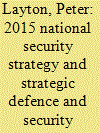

|
|
|
|
|
| Summary/Abstract |
In devising the 2015 National Security Strategy (NSS) and Strategic Defence and Security Review (SDSR), British decision-makers have a choice between trying to shape international affairs to be more favourable or instead planning to respond meaningfully to events that arise. The former grand strategic approach appears favoured however, the latter risk management approach remains the basis for work. That the two approaches are incompatible, distinctly dissimilar and would yield markedly different NSS and SDSR outcomes is generally overlooked. Moreover, opportunism, a third viable approach has been neglected. This article evaluates the three approaches, ascertains their principal advantages and weaknesses and outlines three alternative NSSs and SDSRs based on the different approaches.
|
|
|
|
|
|
|
|
|
|
|
|
|
|
|
|
| 2 |
ID:
181229


|
|
|
|
|
| Summary/Abstract |
This article investigates the context and development of the Israel Defence Industries (IDI) during the period 1930–2018. During this timeframe, the IDI was forced to transform several times with the Israel Ministry of Defence acting as the main facilitator. Well established links among government institutions, academia, investors and the IDI contribute to armament quality and innovations which supports market expansion. Nevertheless, US support remains an important enabler in facilitating the IDI developments. Nowadays, the IDI is an important player in Israeli economics that contributes to the exports and facilitates developments in other sectors.
|
|
|
|
|
|
|
|
|
|
|
|
|
|
|
|
| 3 |
ID:
133979
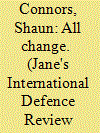

|
|
|
|
|
| Publication |
2014.
|
| Summary/Abstract |
The UK Ministry of Defence's (MoD's) Multi Role Vehicles - Protected (MRV-P) programme is intended to replace around 50% of the current soft-skin Land Rover and Pinzgauer light vehicle fleet with a capability better suited to projected future operational requirements, and a senior defence official has set out from details for the first time.
|
|
|
|
|
|
|
|
|
|
|
|
|
|
|
|
| 4 |
ID:
121864
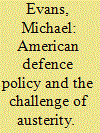

|
|
|
|
|
| Publication |
2013.
|
| Summary/Abstract |
This article examines the Obama administration's attempt to rebalance U.S. strategy towards the Asia-Pacific region with special emphasis on Southeast Asia. It argues that America's regional pivot is occurring at a time of unprecedented domestic fiscal austerity caused by a staggering level of national debt. The U.S. domestic budget crisis, the current "declinist" debate, concern over the rise of China, and the impact of sequestration on American defence spending are analysed and their implications for Southeast Asia are assessed. The article suggests that the most serious aspect of the U.S. debt crisis may be its impact upon American strategic resilience and geopolitical confidence. Thus, while many ASEAN nations have welcomed the U.S. strategic pivot as a valuable reinforcement of their security, they remain unsure that it is a sustainable policy. In the future, it is likely that reassuring ASEAN of the longevity of the U.S. commitment to the Asia-Pacific will require of Washington a skilled blend of budgetary reform, military presence, and sustained diplomatic effort.
|
|
|
|
|
|
|
|
|
|
|
|
|
|
|
|
| 5 |
ID:
122009


|
|
|
|
|
| Publication |
2013.
|
| Summary/Abstract |
In a television interview in November 2011, former head of Mossad Meir Dagan warned that an Israeli attack on Iran's nuclear facilities could lead to a regional war involving actors such as Hizbullah, Hamas and Syria. Israeli Prime Minister Benjamin Netanyahu has had a different view. In October 2012, he told French magazine Paris Match that such an attack would stabilise the Middle East:
Five minutes after, contrary to what the skeptics say, I think a feeling of relief would spread across the region … Iran is not popular in the Arab world, far from it, and some governments in the region, as well as their citizens, have understood that a nuclear-armed Iran would be dangerous for them, not just for Israel.
US officials, however, predict that Arab states would have a strong reaction to an independent Israeli attack. Such an assault is likely to sever Israel's already limited diplomatic relations with Arab states, they argue, and may destroy its peace treaties with Egypt and Jordan. Washington believes that an attack would give rise to popular protests in the Arab world, forcing its leaders to act.
|
|
|
|
|
|
|
|
|
|
|
|
|
|
|
|
| 6 |
ID:
153358
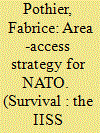

|
|
|
|
|
| Summary/Abstract |
With the decisions taken at the Warsaw Summit in July 2016, NATO crossed a new symbolic threshold. For the first time since the end of the Cold War, NATO will deploy, on a quasi-permanent basis, troops on the eastern flank of the Alliance. This move, touted by the Alliance as historic, is meant to reassure nervous allies and to deter Russia from crossing the sacred border of NATO territory.
|
|
|
|
|
|
|
|
|
|
|
|
|
|
|
|
| 7 |
ID:
130868
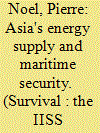

|
|
|
|
|
| Publication |
2014.
|
| Summary/Abstract |
Asia's reliance on international, seaborne energy trade is conducive to strategic cooperation. Whether this will outweigh strategic competition is far from certain. The Asia-Pacific accounts for a large and growing share of the world's energy-demand growth. With imports rising faster than consumption, the region is rapidly becoming the new centre of gravity for global energy markets. Such dynamics have made energy security a key policy concern for Asian states. The naval capacities of these countries are also growing swiftly, prompting some analysts to ask whether an arms race has begun. Although no one would suggest that this build-up of naval power is primarily driven by the need to secure energy supplies, the Chinese and Indian governments have identified energy and resource security as one rationale for developing naval power, particularly blue-water capabilities.
|
|
|
|
|
|
|
|
|
|
|
|
|
|
|
|
| 8 |
ID:
141786
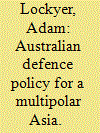

|
|
|
|
|
| Summary/Abstract |
There is a growing consensus among defence planners that Australia is in need of a new defence policy that better suits the strategic realties of an emerging multipolar Asia. After assessing the implications of shifting regional power balances for Australia, this article advances the argument that Australia should redirect its attention back to its immediate north: the “Indo-Pacific Arc”. Indonesia, Singapore and Malaysia have always been vitally important to Australia’s long-term security and, being the gateway between the Indian and Pacific oceans, their strategic value is set to dramatically increase in the multipolar Asia. Finally, this article develops the case for Australia to partner with its neighbours to stem the political and military influence of outside powers into the Indo-Pacific Arc.
|
|
|
|
|
|
|
|
|
|
|
|
|
|
|
|
| 9 |
ID:
183513


|
|
|
|
|
| Summary/Abstract |
Australian strategic studies scholars have traditionally made an outsized impact on the world stage. This reflection upon the past, present and future of their field begins by seeking to explain why. It then takes stock of Australian strategic studies today, finding a flourishing field that stacks up remarkably well, even when measured against the exploits of its illustrious past. The essay concludes by identifying the main challenges and opportunities facing Australian strategic studies going forward, suggesting possible approaches for addressing these.
|
|
|
|
|
|
|
|
|
|
|
|
|
|
|
|
| 10 |
ID:
093462
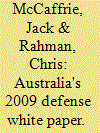

|
|
|
| 11 |
ID:
069405
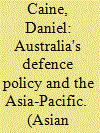

|
|
|
| 12 |
ID:
069406
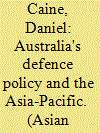

|
|
|
| 13 |
ID:
069422
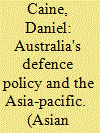

|
|
|
| 14 |
ID:
099686
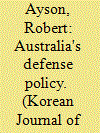

|
|
|
|
|
| Publication |
2010.
|
| Summary/Abstract |
Australian defense policy suggests a case where strategic ambitions exceed the country's direct security needs. But there are some peculiar reasons for this state of affairs. These include the relationship between the size of the Australian continent and its proximity to maritime Asia; Australia's sense of itself as a medium power with a strong interest in the future of the wider regional strategic balance; and the long-standing judgment that Australia needs a capacity for independent military action in its own area because even its closest allies cannot always be expected to help out. The Rudd government's 2009 Defence White Paper, the first such document in nearly a decade, confirms this pattern of thinking. In particular it reflects Australia's interest in not falling behind the defense modernization in the wider region of strong and rising powers (including, but by no means limited to, China). It helps return a sense of coherence to Australian policy which went missing in the post-9/11 era. But the new White Paper risks pushing that familiar logic too far. The Australian Defence Force envisaged for 2030 includes a larger flotilla of new-generation submarines, 100 Joint Strike Fighters alongside other capable combat aircraft, air warfare destroyers and new frigates. Many of these platforms, the White Paper suggests, could be armed with cruise missiles. This leaves no doubt that the writers of this review are serious about maritime operations in the Asian century. But one is left wondering whether the Rudd government and its successors can and will deliver on the whole package, and whether a more optimistic assessment of the region's strategic future could allow for a defense force which is closer to what has gone before.
|
|
|
|
|
|
|
|
|
|
|
|
|
|
|
|
| 15 |
ID:
132864


|
|
|
|
|
| Publication |
2014.
|
| Summary/Abstract |
This article draws on fourth generation strategic culture debates to show the gap between the rhetoric of Australian defence and the more modest reality. Our analysis shows that these limits derive from tensions between national strategic culture and organizational strategic subcultures. There are serious debates in the nation regarding the preferred course of the Australian military and security policy. This article frames these debates by examining the 'keepers' of Australia's national strategic culture, the existence of several competing strategic subcultures, and the importance of norm entrepreneurs in changing defence and national security thinking. Strategic subcultures foster compartmentalization, constraints, and bureaucratic silos that narrow national conceptions of security threats and opportunities, and impinge on the formation of coherent foreign and defence policy in relation to the Asia-Pacific region. This analysis shows that a distinct national strategic culture and organizational strategic subcultures endure beyond individual governments, placing potential limits on Australia's interface with other Asia-Pacific strategic cultures in the future.
|
|
|
|
|
|
|
|
|
|
|
|
|
|
|
|
| 16 |
ID:
126468


|
|
|
|
|
| Publication |
2012.
|
| Summary/Abstract |
Boeing has a long history in India, beginning with its 707 commercial jetliner that was acquired by Air India in 1960. The wait for successful military orders took much longer, but Boeing has done its homework well to come out on top for important contracts for the Indian Air Force (IAF) and Indian Navy (IN). Importantly for Boeing, the orders all have the potential for repeat orders, ensuring that Boeing will be busy well into the next decade. Boeing's success in the Indian market is also a huge opportunity for Indian aerospace and software companies as Boeing purchases goods and services from more than 23,000 suppliers across the world worth more than USD 50 billion each year. The company's global supply chain contributes more than 60 per cent of the value of its products. Boeing delivered 601 commercial airplanes and supported the delivery of 144 production military aircraft in 2012!
|
|
|
|
|
|
|
|
|
|
|
|
|
|
|
|
| 17 |
ID:
163353
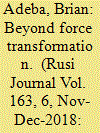

|
|
|
|
|
| Summary/Abstract |
South Sudan’s decade-old defence policy is dated. In this article, Brian Adeba argues that a new defence policy which is tethered to a national security framework that accounts for evolving security challenges and addresses missed opportunities for professionalising the Sudan People’s Liberation Army is necessary.
|
|
|
|
|
|
|
|
|
|
|
|
|
|
|
|
| 18 |
ID:
057327
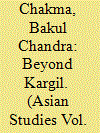

|
|
|
| 19 |
ID:
086947


|
|
|
|
|
| Publication |
2009.
|
| Summary/Abstract |
The Labour government's 1998 Strategic Defence Review (SDR) marked the end of almost twenty years during which Labour had been little more than a bystander in British defence policy-making. The 'foreign policy-led' SDR marked an impressive and authoritative debut, emulated by other national governments. Ten years later, however, the SDR is a fading memory. British defence is out of balance and facing immense stress, and calls are mounting for a new strategic defence review. This article examines the difficult choices which a defence review would have to make. But a defence review also requires the governmental machinery with which to analyse and understand defence, and with which those difficult choices can be made. The article argues that this machinery is wearing out. Defence policy, planning and analysis in the United Kingdom have reached a state of organizational, bureaucratic and intellectual decay which may be irrecoverable.
|
|
|
|
|
|
|
|
|
|
|
|
|
|
|
|
| 20 |
ID:
130819
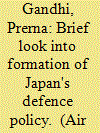

|
|
|
|
|
|
|
|